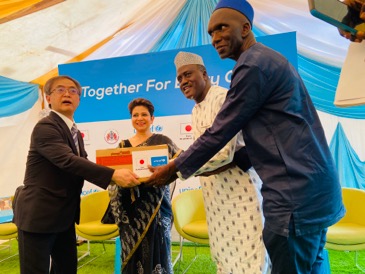
[ad_1]

The life-saving supplies, which include 2,500 cartons of ready-to-use therapeutic foods, 1,100 cartons of F 75 milk and 100 cartons of F 100 milk, will be delivered to health facilities across the country to strengthen the Integrated Management of Acute Malnutrition.
According to officials, the supplies will be used to treat more than 2,500 children under the age of five suffering from severe acute malnutrition. In addition, the supplies include 1,000 boxes of micronutrient powder to prevent anemia in 10,000 children under the age of five.
During the handover ceremony, Mr. Shinichi Hirose, Counsellor and Deputy Head of Mission of the Embassy of Japan in The Gambia, expressed his delight at the collaboration in developing and implementing this important project, which he said was directly linked to human security, especially during the critical rainy season, and impacted the daily lives of many Gambians.
“The Government of Japan, through UNICEF, has allocated US$716,040 to The Gambia to provide emergency assistance to people affected by flooding, food insecurity and malnutrition in all seven regions of The Gambia. This assistance includes life-saving nutrition, safe drinking water, sanitation and hygiene services to help boost the resilience of vulnerable groups, especially children, girls and mothers,” he said.
“Japan is very sensitive to the diverse impacts of climate change on African countries.“
He said this is why Japan proposed two initiatives to address food shortages and health issues at the TICAD7 meeting held in Yokohama in August 2019, namely the Africa Health and Well-being Initiative and the Initiative for Food and Nutrition Security in Africa (IFNA).
UNICEF Country Representative, Ms. Nafisa Bint Shafiq, acknowledged that malnutrition has serious consequences for children, affecting their health, intellectual development and productivity.
“Through collaboration with the Ministry of Health and other health partners, we have seen improved results in the management of malnutrition among children under five years of age.”
“Between 2013 and 2019, the prevalence of stunting, wasting or underweight among children under five years of age fell from 25% to 18% and from 10% to 5%, respectively. With continued commitment and resources, we can still do better. By building strong partnerships, we can galvanize national efforts and mobilize communities to ensure every child grows up happy, healthy and strong.”
Furthermore, she recalled that between 2016 and 2020, more than 21,000 children under five years of age were hospitalized for severe acute malnutrition and more than 19,000 lives were saved through the integrated health system. Programmatic management of acute malnutrition.
Malang Fofana, Executive Director of the National Nutrition Agency (NaNA), revealed that the country is truly experiencing the “triple burden of malnutrition”, which is the coexistence of undernutrition (stunting, wasting and underweight), overnutrition (overweight and obesity, precursors to diet-related non-communicable diseases) and micronutrient deficiencies (particularly vitamin A deficiency, iron deficiency anaemia and intellectual disability).
“This is largely due to changes in diet, lifestyle and climate change which are influencing the nutritional transition our country is going through. Much of our diet today is based on highly processed foods containing high amounts of fat, sugar and salt.”
He added: “In 2023, the population of children under five years of age is estimated at 390,655. Of these, approximately 20,000 children are wasted in 2023. The current rate of severe wasting is 2.1 per cent, of which more than 8,000 children are estimated to fall into the severe acute malnutrition category. Only about 50 per cent of children were treated in 2023, which indicates the need for increased advocacy to mobilize more resources to increase coverage.”
To this end, Fofana thanked the Government of Japan for its technical and financial support over the years in implementing nutrition programmes, and looked forward to receiving more support and cooperation in the quest for greater success.
[ad_2]
Source link

